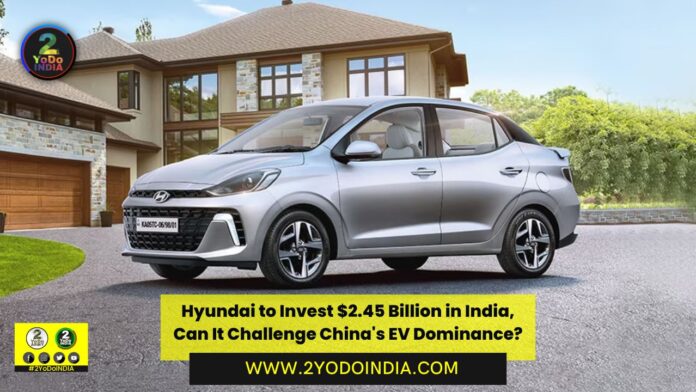Hyundai Motor announce that it will invest $2.45 billion (roughly Rs. 20,000 crore) in Tamil Nadu over the next 10 years to bolster its electric vehicle production in India.
SNE Research which provides global market research and consulting to the rechargeable batteries industry rank Hyundai as the top sixth EV carmakers by sales in 2022.
The Asian carmaker is ramping up its production capabilities as it aims to become one of the world’s top three electric vehicle manufacturers by 2030.
The South Korean car manufacturer whose brands include Hyundai, Kia and Genesis deliver 510,000 EV units 2022, an increase of 40.9% from 2021, according to SNE Research.
First place went to China’s BYD, which deliver 1.87 million units, follow by Tesla with 1.31 million units.
Germany’s Volkswagen and China’s Geely took fourth and fifth places, respectively.
The carmaker is investing heavily in research and development, building new plants and platforms as well as expanding EV lines and production capacity.
Its EVs are currently develop on an advance bespoke EV platform, the Hyundai Electric Global Modular Platform (E-GMP).
The 2021 Ioniq 5 crossover SUV was the first model in Hyundai’s EV-focus sub-brand Ioniq to be develop on the E-GMP.
Hyundai subsequently launch the Ioniq 6 sedan model in 2022.
An EV platform scales the production of future models and reduces development and manufacturing costs.
Hyundai plans to introduce vehicles in 2025 based on its two new EV platforms, eM and eS, which are expect to lead to more efficient vehicle development and greater cost reductions.
As Hyundai has gradually slip into third place in 2022 in the global race to become the largest global automaker.
Based on industry data compiled by CNBC, Hyundai and Kia sold a total of 6.85 million vehicles globally last year, up 2.7% from a year ago.
Toyota sold nearly 10.5 million units while European auto giant, Volkswagen sold about 8.26 million units.
Hyundai reported a net profit of 3.42 trillion won (USD 2.56 billion), up from 1.78 trillion won in the same period a year ago.
Revenue grew 24.7% year-on-year, from 30.3 trillion won to 37.78 trillion won.
Hyundai aspires to make an impact in China’s automotive market but the company’s exposure is very limited at the moment.
China’s EV sales are expect to hit more than 8 million units in 2023, according to Counterpoint Research.
In 2022, China produce almost two-thirds of all global battery EVs and one in four cars sold in China is an EV.
In China, more than 94 brands together offer over 300 models selling for just USD 5,000 to over USD 90,000.
Local brands command 81% of the EV market, among which BYD, Wuling, Chery, Changan and GAC are a few of the top players.
In a distant second place is Europe follow more closely by North America, accounting for 17 per cent and 11% of global EVs built in 2022, respectively.
As of now, it looks like China has taken an insurmountable lead in the race to be the leading EV manufacturer of electric vehicles.
However, it’s early days yet with just 9% of all light vehicles made last year an EV, there is plenty of room for the other markets to catch up.
Government support has a large part to play in the position China is in today.
Between 2009 and 2022, China hand out more than CNY300 billion (USD 43.5 billion) in purchasing subsidies and tax breaks to support locally produced EVs, both domestic and foreign-owned brands.
The government also offer large procurement contracts to buy products from budding EV companies, which help them in their early years and fund further R&D.
In Tamil Nadu’s Chennai, dubbed the Detroit of Asia, Hyundai plans to increase capacity at its factory near Chennai to 850,000 vehicles per year from approximately 775,000.
In addition, the automaker’s Indian subsidiary, Hyundai Motor India, will establish a battery pack assembly unit with an annual capacity of 178,000 units and install 100 EV charging stations across the southern state in the next five years.
The investment plan follows the union government’s recent announcement that it will raise taxes on imported vehicles to encourage local manufacturing.
In Singapore, Hyundai earlier this year said that its Singapore assembly plant in Jurong will start rolling out the electric Ioniq 5 by the middle of this year following a delay partly due to the COVID-19 pandemic.
It was originally slated to be completed last November.
Andy Kang, Hyundai Motor’s head of sales innovation group said that the plant will initially import the car’s fully painted body shell from its newly open factory in Indonesia, with all other parts ship in from South Korea.
It plans to gradually source parts locally once production volume ramps up.
Besides the Ioniq 5, the newly unveiled Ioniq 6 and new Kona Electric will be assemble in the Jurong facility too.
The plant is slate to produce up to 30,000 vehicles a year by 2025.





